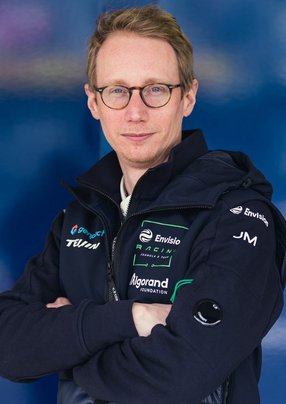As a motorsports team, collaboration becomes second nature and drives success on the track. But the electric vehicle (EV) racing team Envision Racing took its joint efforts further when it partnered with Genpact in 2018. Since then, the team has witnessed growth and development in the way it uses data to compete.
The man in charge of technical development and a critical individual in the partnership between the two organisations, Sylvain Filippi, CTO at Envision Racing, spoke about the challenges they have overcome together and how data and analytics is driving the use of artificial intelligence (AI) trackside.
The Envision Racing team was formed to compete in the Formula E motorsport and sustainability initiative, by Envision Group—a leading renewable energy, digital and e-mobility organisation headquartered in Shanghai. Envision has been developing renewable energy technologies in wind, solar, and hydrogen, as well as EV battery and charging solutions. This is where the team is rooted and Formula E is another facet of its operations.
Partnering with Genpact to implement data strategy
At the Envision racing workshop at Silverstone Race Track, UK, Filippi discussed the partnership between Envision Racing and Genpact, alongside its Chief Digital Strategist, Sanjay Srivastava. The event at the Envision Racing unit was a chance to gain more insight into the team’s origins, how it operates and the relationship between the partners.
Filippi explains the significance of Formula E and why developments of the race car must be aligned to the capabilities of commercially-available cars, along with the motorsport’s sustainability missions.
“The main purpose of Formula E is really to accelerate the innovation in electric cars and ultimately accelerate the adoption of electric cars. The roadmap of the sport has been very carefully created by the FIA and everybody at formula E, the promoters and the teams, to make sure that we are focusing on what matters,” says Filippi.
“For example, we're not really doing any work on dynamics and chassis development because, even though it could make the race car go faster, it's not really relevant to developing electric road cars.”
This is what really sets the motorsport apart from its sister races. Unlike Formula 1, there are sustainability restrictions that shape the way teams develop their cars. As explained by Filippi, there are many adaptations that could be made to the Formula E vehicle to make it faster, but this would not be aligned with the core message of sustainability and wider EV application. Therefore data is one of the deciding factors in race performance.
“We are focusing our energy, attention and resources on developing the power train, which is what makes a difference. Ultimately, improving the efficiency, range and power of the car is what really improves road cars —the cars of the future.”
A new generation of EV motorsport
As the motorsport continues through its final few races of its eighth season, Formula E awaits the next generation vehicle, which is currently in testing with Jaguar TCS. Commenting on this, Filippi provided some of the critical figures of the car’s performance, including the shift from 250 kilowatts (kW) of power to 350kW in the generation three model.
“A huge jump, but the new car is also lighter by around 60 kilograms, which in motorsport terms is really significant. The new car is light, but also shorter, which is really good for racing. The focus for gen three is really going to be on performance and to show that the potential for electric cars is huge,” says Filippi.
The latest version of the Formula E car will also leverage better use of regenerative braking, which is one of the major technology benefits to be echoed across consumer vehicle brands. Not only is it assistive in racing, but also allows the car to conserve more energy to make it round the track.
“I'm really excited about Formula E in general because of many aspects,” Filippi says.
“Of course I love racing and the idea that we can make these race cars as fast as they can be, but really I love showcasing what electric technology can do.”


